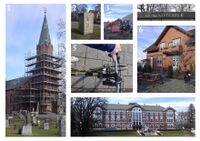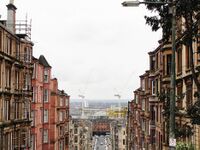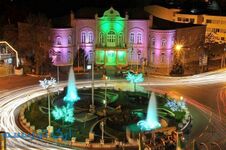LED Seminar 2016 - Landscape Symbols Reflection Group G
Landscape Symbol 1- Landscape Symbols As, Tonje Cecilie Stordalen
Representations and analytical drawings
in addition to your initial visual please add two further analytical drawings of your symbol
- GroupI slide2.JPG
slide 2
- GroupI slide3.JPG
slide 3
Reflections
Please write a 250 words text reflecting on the following questions, you can also take ideas from your group members into account
- How and why did the symbols you identify appear in your landscape?
- Did their meaning change along with socio-political, economic, environmental or cultural changes in your region, or country?
- What do these symbols mean to you today? Are they meaningful to more than just one cultural group? Are they shared across cultures?
add your text here
Landscape Symbol 2- Democratic Republic of the Congo, Sharla Russell
Representations and analytical drawings
in addition to your initial visual please add two further analytical drawings of your symbol
- GroupI slide2.JPG
slide 2
- GroupI slide3.JPG
slide 3
Reflections
Please write a 250 words text reflecting on the following questions, you can also take ideas from your group members into account
- How and why did the symbols you identify appear in your landscape?
- Did their meaning change along with socio-political, economic, environmental or cultural changes in your region, or country?
- What do these symbols mean to you today? Are they meaningful to more than just one cultural group? Are they shared across cultures?
add your text here
Landscape Symbol 3- Glasgow Tenements, Amber Roberts
Representations and analytical drawings
in addition to your initial visual please add two further analytical drawings of your symbol
- GroupI slide2.JPG
slide 2
- GroupI slide3.JPG
slide 3
Reflections
Please write a 250 words text reflecting on the following questions, you can also take ideas from your group members into account
- How and why did the symbols you identify appear in your landscape?
- Did their meaning change along with socio-political, economic, environmental or cultural changes in your region, or country?
- What do these symbols mean to you today? Are they meaningful to more than just one cultural group? Are they shared across cultures?
Glasgow's Tenements
The class-neutral tenements of Glasgow symbolise the ideals of Scottish socialism, standing in stark contrast to the strict delineations of England's housing typology. As a new resident in Scotland I am keen to explore this point of difference in the 'everyday landscape' of Glasgow and its permutations through the tenement street that foregoes traditional centralised urban form and hierarchical street types, instead following a rigid and decentralised grid-iron pattern. Throughout the past century the tenements have become synonymous with Glasgow while the initial ideals they represented changed repeatedly through associations with rebellion and protest. At the same time the tenements continue to form the backdrop to the daily lives of the majority of the city's residents throughout the social classes.
How and why the symbols appeared in the landscape
How meanings have changed
What the tenements mean today
Landscape Symbol 4-7000 Eichen Kassel, Linda Rehn
Representations and analytical drawings
in addition to your initial visual please add two further analytical drawings of your symbol
- GroupI slide2.JPG
slide 2
- GroupI slide3.JPG
slide 3
Reflections
The basalt stone can be found next to a tree,usually an oak. Overall the city were 7000 Oaks for each basalt stone planted. This ensemble is titled “7000 Oaks - urban forestation instead of city administration”, and is a landscape art work of the artist Joseph Beuys. 1982, at the start the documenta 7, Beuys put 7000 basalt columns as a wedge-shaped delta on the Friedrichsplatz in front of the Fridericianum in Kassel which is a major place and building. At its peak, Beuys planted the first oak next to their associated basalt stone. The basalt plastic acts according to Beuys as an indicator of progress. The more trees have been planted in Kassel, the smaller the plastic. "Not building, not dismantling, but both at the same function". Everyone who donated $ 500, was allowed to remove a block of basalt and for planting elsewhere an oak tree, which then the respective block of stone was delivered. In 1987, the extensive project documentation was completed. The project was an extensive artistic and ecological intervention with the aim of changing the urban environment sustainably in terms of overall urbanization. The initially controversial project has evolved into a townscape part of the public space of the city of Kassel, and witness the "expanded concept of art" developed by Joseph Beuys. The as "social sculpture" marked artwork engages sustainable in the topographical and social structure of the city, it also committed to active care and kept alive in this way. In Kassel in 1993 also the club founded "7000 Oaks", who has made the protection and care of trees to the task. About the effects Rhea Thönges-Stringaris (Kassel) wrotes: There is hardly anyone in Kassel who met Beuys trees in Avenue rows or squares. We have become accustomed to them. They are part of our daily life and at the same time components of an unusual, because ultimately invisible sculpture. No one can ever see as a whole. A sculpture in the traditional sense, without outlines, is unthinkable. But outlines of the 7000 Oaks are not even tangible on paper or on a map. The landscape architect John Steiner in Stuttgart gathered the fruit of the oaks, put them in flower pots and outputs the resulting growing plants (project Eichenfeldstraße - Getting younger generation). Olaf-Axel Burow and the project group Future Moderation Kassel University initiated in 2002 under the Kassler Application for European Capital of Culture a project with the motto 7000 characters in terms of Beuys Social Sculpture. The action should raise awarness about the aesthetic deep structure of the city of Kassel . On 16 March 2012, the 30th anniversary of the 7000 Oaks was celebrated and consecrated in honor of the artist Joseph Beuys a street was named after him in Kassel. This was the reason, there to add another unit of tree and stone. The Dia Center for the Arts planted in 1988 five trees, each with a basalt stone, in New York. In 1996 the work was extended with 18 new trees was. One oak basalt column was planted in the park of the government district of Düsseldorf.
Landscape Symbol 5- Guido Maria Amorati
Representations and analytical drawings
in addition to your initial visual please add two further analytical drawings of your symbol
- GroupI slide1.JPG
slide 1
- GroupI slide2.JPG
slide 2
- GroupI slide3.JPG
slide 3
Reflections
Please write a 250 words text reflecting on the following questions, you can also take ideas from your group members into account
- How and why did the symbols you identify appear in your landscape?
- Did their meaning change along with socio-political, economic, environmental or cultural changes in your region, or country?
- What do these symbols mean to you today? Are they meaningful to more than just one cultural group? Are they shared across cultures?
add your text here
Landscape Symbol 5- Square in Iran Bahman Nahri
Representations and analytical drawings
in addition to your initial visual please add two further analytical drawings of your symbol
- GroupI slide2.JPG
slide 2
- GroupI slide3.JPG
slide 3
Group reflection
Please add a summary of your group reflection here




